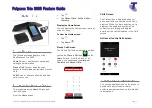
96
Callback
When an extension user calls a co-worker that does not answer or is busy, they
can leave a Callback request for a return call. The user does not have to
repeatedly call the unanswered extension back, hoping to find it idle.
The system processes Callback requests as follows:
1.
Caller at extension A leaves a Callback at extension B.
Caller can place or answer additional calls in the meantime.
2.
When extension B becomes idle, the system rings extension A. This is the Callback ring.
3.
Once caller A answers the Callback ring, the system rings (formerly busy or
unanswered) extension B.
If caller A does not answer the Callback ring, the system cancels the Callback.
4.
As soon as caller B answers, the system sets up an Intercom call between A and B.
Callback Automatic Answer determines how an extension user answers the Callback
ring. When Callback Automatic Answer is enabled, a user answers the Callback
ring when they lift the handset. When Callback Automatic Answer is disabled, the
user must press the ringing line appearance to answer the Callback ring.
Conditions
An extension can leave only one Callback request at a time.
Call Arrival (CAR) Key (virtual extension) keys do not support
Call Waiting/ Camp-On Programmable Function keys (code
35).
If an extension user initiates a Callback but does not hang up,
their extension Camps-On to the busy extension.
Function Keys simplify Callback operation.
The Callback feature is not available when calling a busy station from
a Wireless DECT (SIP) handset.
Default Settings
Enabled
C
Summary of Contents for Univerge SV9100
Page 1: ... SV9100 Features and Specifications Manual Rev 1 2 March 2016 ...
Page 64: ...64 Required Component s None ...
Page 238: ...238 Walking Code Restriction 663 ...
Page 239: ...239 Temporary Code Restriction Override service code be changed 775 ...
Page 285: ...285 Single Line Telephone 1 Lift the handset A fast busy is heard 2 Dial 759 3 Hang up ...
Page 332: ...332 Circular Routing Department Calling Circular Routing CALL 1 CALL 2 CALL 3 CALL 4 ...
Page 406: ...406 Trunk Distinctive Ringing Flow Chart ...
Page 407: ...407 ICM Distinctive Ringing Flow Chart ...
Page 442: ...442 CCIS Standard Calls ...
Page 447: ...447 CCIS VE Standard Calls ...
Page 456: ...456 CPN sent when making a 911 call across CCIS trunks from a terminal ...
Page 461: ...461 CCIS VE 911 Calls ...
Page 637: ...637 Cascade Message Notification Flow Chart 1 ...
Page 638: ...638 Cascade Message Notification Flow Chart 2 ...
Page 639: ...639 Cascade Message Notification Flow Chart 3 ...
Page 655: ...655 Cascade Message Flow Chart 1 ...
Page 808: ...808 DTI U40 ETU Programming Flowchart for ISDN PRI Answering Calls the GCD PRTA Overlap ...
Page 813: ...813 ...
Page 844: ...844 None Related Features None Guide to Feature Programming None Operation None ...
Page 915: ...915 Communications Interface feature for more ...
Page 916: ...916 ...
Page 917: ...917 Operation None ...
Page 948: ...948 Operation Normal call handling procedures for single line telephones apply ...
Page 1015: ...1015 Related Features None Guide to Feature Programming None Operation None ...
Page 1026: ...1026 Operation Refer to Central Office Calls Answering ...
Page 1030: ...1030 Multiline Room Monitoring ...
Page 1031: ...1031 Single Line Telephone Room Monitoring ...
Page 1146: ...1146 SMDR Flowchart Continued ...
Page 1147: ...1147 SMDR Flowchart Continued ...
Page 1371: ...1371 ...
Page 1400: ...1400 To answer off hook signaling 2nd call and 2nd caller disconnect the call NOTE ...
Page 1402: ...1402 SV9100 Features and Specifications Manual NEC Enterprise Solutions ...
















































